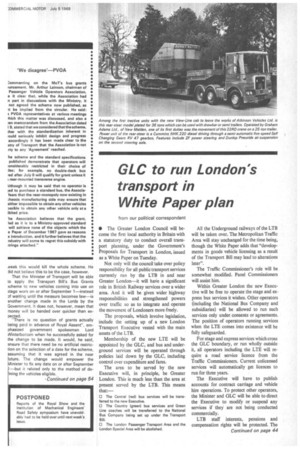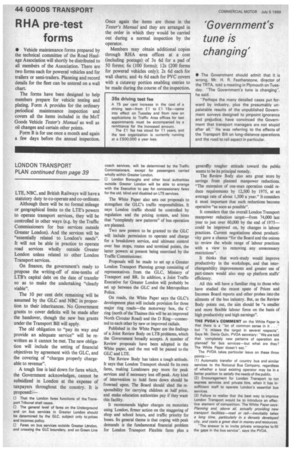GLC to run London's transport in White Paper plan
Page 41

Page 46

If you've noticed an error in this article please click here to report it so we can fix it.
from our political correspondent • The Greater London Council will become the first local authority in Britain with a statutory duty to conduct overall transport planning, under the Government's Proposals for Transport in London, issued as a White Paper on Tuesday.
Not only will the council take over policy responsibility for all public transport services currently run by the LTB in and near Greater London—it will have a significant role in British Railway services over a wider area. And it will be given wider highway responsibilities and strengthened powers over traffic so as to integrate and operate the movement of Londoners more freely.
The proposals, which involve legislation, include the setting up of a new London Transport Executive vested with the main assets of the LTB.
Membership of the new LTE will be appointed by the GLC, and bus and underground services will be operated through policies laid down by the GLC, including control over expenditure and fares.
The area to be served by the new Executive will, in principle, be Greater London. This is much less than the area at present served by the LTB. This means that:—
El The Central (red) bus services will be transferred to the new Executive.
O The Country (green) bus services and Green Line coaches will be transferred to the National Bus Company being set up under the Transport Bill, O The London Passenger Transport Area and the London Special Area will be abolished.
All the Underground railways of the LTB will be taken over. The Metropolitan Traffic Area will stay unchanged for the time being, though the White Paper adds that "developments in goods vehicle licensing as a result of the Transport Bill may lead to alterations later".
The Traffic Commissioner's role will be somewhat modified. Panel Commissioners will assist him.
Within Greater London the new Executive will be free to operate the stage and express bus services it wishes. Other operators (including the National Bus Company and subsidiaries) will be allowed to run such services only under. consents or agreements. The position of operators running services when the LTE comes into existence will be fully safeguarded.
For stage and express services which cross the GLC boundary, or run wholly outside• it, all operators including the LTE will require a road service licence from the Traffic Commissioners. Current unlicensed services will automatically get licences to run for three years.
The Executive will have to publish accounts for contract carriage and vehicle hire operations. To protect other operators, the Minister and GLC will be able to direct the Executive to modify or suspend any services if they are not being conducted commercially.
LTB staff interests, pensions and compensation rights will be protected. The Continued on page 44 LONDON TRANSPORT PLAN continued from page 39 LTE, NBC, and British Railways will have a statutory duty to co-operate and co-ordinate.
Although there will be no formal mileage or geographical limits to the LTE's powers to operate transport services, they will be controlled in other ways (e.g. by the Traffic Commissioners for bus services outside Greater London). And the services will be "essentially related to London's needs". It will not be able in practice to operate road services wholly outside Greater London unless related to other London Transport services.
On finance, the government's ready to propose the writing-off of nine-tenths of LTB's capital debt on the date of transfer so as to make the undertaking "clearly viable".
The 10 per cent debt remaining will be assumed by the GLC and NBC in proportion to their inheritances. No Government grants to cover deficits will be made after the handover, though the new bus grants under the Transport Bill will apply.
The old obligation to "pay its way and provide an adequate service" will be rewritten as it cannot be met. The new obligation will include the setting of financial objectives by agreement with the GLC, and the covering of "charges properly chargeable to revenue".
A tough line is laid down for fares which, the Government acknowledges, cannot be subsidized in London at the expense of taxpayers throughout the country. It is proposed:—
El That the London fares functions of the Transport Tribunal shall cease.
El The general level of fares on the Underground and on bus services in Greater London should be determined by the GLC, subject only to prices and incomes policy.
0 Fares on bus services outside Greater LOndon, and crossing the GLC boundary, and on Green Line coach services, will be determined by the Traffic Commissioners, except for passengers carried wholly within Greater London.
CI London Boroughs and other local authorities outside Greater London will be able to arrange with the Executive to pay for concessionary fares for the old, blind and disabled on LTE services.
The White Paper also sets out proposals to strengthen the GLC's traffic responsibilities. It says London traffic should be controlled by regulation and the pricing system, and hints that "completely new patterns" of bus operation are planned.
Two new powers to be granted to the GLC will include permission to operate and charge for a breakdown service, and ultimate control over bus stops, routes and terminal points, the latter powers at present being exercised by the Traffic Commissioner.
Proposals will be made to set up a Greater London Transport Planning group consisting of representatives from the GLC, Ministry of Transport and BR. In addition, a Joint Traffic Executive for Greater London will probably be set up between the GLC and the Metropolitan Police.
On roads, the White Paper says the GLC's development plan will include provision for three major ring roads—the motorway box, the C ring (north of the Thames this will be an improved North Circular Road) and the D Ring—connected to each other by new or improved radials.
Published in the White Paper are the findings of a Joint Review Body on LTB problems, which the Government broadly accepts. A number of Review proposals have been adopted in the White paper, and the rest will be passed to the GLC and LTE.
The Review Body has "taken a tough attitude. It says that London Transport should fix its own fares, making Londoners pay more for peak services and if necessary less off-peak. Any kind of intervention to hold fares down should be frowned upon. The Board should shed the responsibility for carrying children at half price, and make education authorities pay if they want this facility.
It recommends higher charges on motorists using London, firmer action on the staggering of shop and school hours, and traffic priority for buses. Its general theme is that coping with peak demands is the fundamental financial problem for London Transport Flexible fares plus a generelly tougher attitude toward the public seems to be its principal remedy.
The Review Body also sets great store by savings from planned manpower reductions, "The extension of one-man operation could reduce requirements by 12,500 by 1975, at an average rate of about 1,500 a year." It considers it most important that such reductions become operative "as soon as possible".
It considers that the overall London Transport manpower reduction target—from 74,000 last year to just over 60,000 by the end of 1975— could be improved on, by changes in labour practices. Current negotiations about productivity gave a chance "for the Board and the unions to review the whole range of labour practices with a view to removing any unnecessary restrictions".
It thinks that work-study would improve productivity in the workshops, and that interchangeability improvements and greater use of part-timers would also step up platform staffs' efficiency.
All this will have a familiar ring to those who have studied the recent spate of Prices and Incomes Board reports and other probes into the ailments of the bus industry. But, as the Review Body points out. the aim should be "a smaller and more flexible labour force on the basis of high productivity and high earnings".
THE PV0A's COMMENT on the White Paper is that there is a "lot of common sense in it . . but "it misses the target in several respects-. Says Mr. Denis Quin. PVOA secretary: -We are told that 'completely new patterns of operation are planned' for bus services—but what are they? The White Paper doesn't say."
The PVOA takes particular issue on these three points:—
(1) Automatic transfer of country bus and similar services to the National Bus Company, regardless of whether a local existing operator may be in a better position to satisfy the needs of the public.
(2) Encouragement for London Transport to run express services and private hire, when it has insufficient staff to operate London's essential bus services.
(3) Failure to realize that the best way to improve London Transport would be to introduce an effective element of competition The White Paper says: Planning and, above all, actually providing new transport facilities—road or rail—inevitably takes a long time, particularly in a densely developed city, and costs a great deal in money and resources.
"The answer is to invite private enterprise to fill the gaps in the bus service-, says the PVOA.
























































































































































